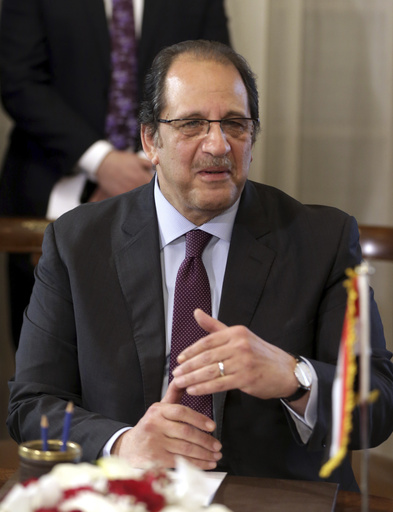CAIRO (AP) — Egypt sent a high-level delegation to Israel for talks Friday seeking to push through a cease-fire agreement with Hamas and avert an Israeli offensive on Gaza’s town of Rafah — on the border with Egypt — which it warned could ruin regional stability, officials said.
Egypt’s top intelligence official, Abbas Kamel, led the delegation and planned to discuss with Israel a “new vision” for a prolonged cease-fire in Gaza, an Egyptian official said, speaking on condition of anonymity to discuss the mission freely.
As the war drags on and casualties mount, there has been growing international pressure for Hamas and Israel to reach an agreement on a cease fire.
Friday’s talks focused at first on a limited exchange of hostages held by Hamas for Palestinian prisoners, and the return of a significant number of displaced Palestinians to their homes in northern Gaza “with minimum restrictions,” the Egyptian official said.
The official said mediators are working on a compromise that will answer most of both parties’ main demands, then lead to continued negotiations with the goal of a larger deal to end the war. A Western diplomat in Cairo said that Egypt’s intensified efforts for a cease-fire aim to avert a Rafah offensive. The diplomat spoke on condition of anonymity to freely discuss the developments.
Hamas has said it will not back down from its demands for a permanent cease-fire and full withdrawal of Israeli troops, both of which Israel has rejected. Israel says it will continue military operations until Hamas is defeated and that it will retain a security presence in Gaza afterwards.
In a statement Friday, Hamas said it is open to any “ideas or suggestions” that take into consideration the needs of the Palestinian people such as an end Israel’s attacks on the Gaza Strip, the return of displaced people to their homes and an Israeli withdrawal.
Both Israeli and Egyptian officials confirmed the Egyptian delegation had arrived in Tel Aviv. Later, the Egyptian official said meetings had concluded and that there was an agreement to work out a draft deal, but he did not elaborate.
Overnight, Lebanon’s militant Hezbollah group fired anti-tank missiles and artillery shells at an Israeli military convoy in a disputed border area, killing an Israeli civilian.
Hezbollah said its fighters ambushed the convoy shortly before midnight Thursday, destroying two vehicles. The Israeli military said the ambush wounded an Israeli civilian doing infrastructure work, and that he later died of his wounds.
Low-intensity fighting along the Israel-Lebanon border has repeatedly threatened to boil over as Israel has targeted senior Hezbollah militants in recent months.
Tens of thousands of people have been displaced on both sides of the border. On the Israeli side, the cross-border fighting has killed 10 civilians and 12 soldiers, while in Lebanon, more than 350 people have been killed, including 50 civilians and 271 Hezbollah members.
Meanwhile, Israel has been conducting near-daily raids on Rafah, a town where more than half of Gaza’s 2.3 million people have sought refuge after fleeing fighting elsewhere in the territory.
The Israeli military has massed dozens of tanks and armored vehicles in southern Israel close to Rafah, in apparent preparations for an invasion.
Rafah also abuts the Gaza-Egypt border. The Egyptian official said that Kamel, who heads Egypt’s General Intelligence Service, planned to make clear in Friday’s talks that Egypt “will not tolerate” an Israeli deployment of troops along that border. Egypt has said an attack on Rafah would violate the decades-old peace deal between Egypt and Israel.
The official said Egypt shared intelligence with the United States and European countries showing that a Rafah offensive would inflame the entire region.
On Wednesday, Egyptian President Abdel Fattah el-Sissi cautioned that an Israeli attack on Rafah would have “catastrophic consequences on the humanitarian situation in the strip, as well as the regional peace and security.”
El-Sissi’s comments came in a phone call with Prime Minister Mark Rutte of The Netherlands, the Egyptian leader’s office said.
Illustrating the pressures facing Israeli Prime Minister Benjamin Netanyahu from the far-right flank of his government, his ultranationalist national security minister, Itamar Ben-Gvir, scoffed on the social media platform X about the Egyptian attempts to bring about a cease-fire.
“The Egyptian proposal arrived because Hamas is afraid of a Rafah operation,” he wrote. “Rafah now!”
The Israel-Hamas war was sparked by the Hamas’ Oct. 7 raid into southern Israel, in which militants killed around 1,200 people, mostly civilians, and took some 250 people as hostages. Israel says the militants are still holding around 100 hostages and the remains of more than 30 others.
More than 34,000 Palestinians have been killed in the war, according to the Health Ministry in Hamas-run Gaza, around two-thirds of them children and women.
The ministry said Friday that the bodies of 51 more people killed in Israeli strikes had been brought to hospitals in the past 24 hours.
Israel has reported at least 260 of its soldiers killed since the start of ground operations in Gaza.
___
Mroue reported from Beirut, Rising reported from Bangkok.
This website uses cookies so that we can provide you with the best user experience possible. Cookie information is stored in your browser and performs functions such as recognising you when you return to our website and helping our team to understand which sections of the website you find most interesting and useful.
